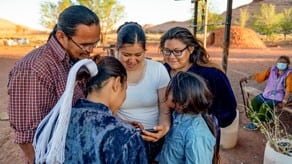At a glance
The National Center for Chronic Disease Prevention and Health Promotion (NCCDPHP) is investing in communities to reduce chronic diseases and equitably address social determinants of health (SDOH).

Overview
NCCDPHP supports programs and partnerships that emphasize evidence-based interventions and community outreach and engagement that expand the evidence for promising practices to:
- Equitably address social determinants of health (SDOH).
- Reduce barriers to health.
- Promote health and wellness for all.
NCCDPHP programs
Addressing Conditions to Improve Population Health (ACTion)
Funds SDOH plans that include policy, system, and environmental change interventions.
Community Health Workers for COVID Response and Resilient Communities
Supports training and use of community health workers in communities that have been most affected by COVID-19.
Closing the Gap With Social Determinants of Health Accelerator Plans
Funds communities to develop multisector action plans to address SDOH.
Enhancing Reviews and Surveillance to Eliminate Maternal Mortality
Supports 44 states and 2 U.S. territories via the Enhancing Reviews and Surveillance to Eliminate Maternal Mortality (ERASE MM) program.
Seeks to promote health, prevent chronic diseases, reduce health disparities, improve SDOH, and strengthen connections to culture and community practices among American Indian and Alaska Native populations.
Builds surveillance systems to close data gaps and works to reduce chronic disease risk factors in U.S. territories and freely associated states.
National Breast and Cervical Cancer Early Detection Program
Helps women with lower incomes and little or no health insurance gain access to timely breast and cervical cancer screening and diagnostic and treatment services.
National Diabetes Prevention Program
Helps people with prediabetes reduce their risk of type 2 diabetes and improve their overall health.
National Networks Driving Action
Supports national organizations to advance the prevention of commercial tobacco use and cancer in populations experiencing tobacco- and cancer-related health disparities.
National Tobacco Control Program
Supports work to advance health equity by identifying and eliminating tobacco-related inequities and disparities.
Prevention Research Centers Program
Funds academic research centers to conduct innovative, community-based public health research to prevent chronic disease, especially among groups affected by health disparities.
Racial and Ethnic Approaches to Community Health (REACH)
Funds state and local health departments, tribes, universities, and community-based organizations to improve health, prevent chronic diseases, and reduce health disparities among racial and ethnic populations with the highest risk, or burden, of chronic disease.
Scaling the National Diabetes Prevention Program in Underserved Areas
Funds national organizations to offer an evidence-based, cost-effective intervention that helps prevent type 2 diabetes in communities with high rates of diabetes risk factors that are underserved by diabetes prevention programs.
Well-Integrated Screening and Education for Women (WISEWOMAN)
Screens women with low incomes for heart disease risk factors and refers women to community resources that can help them reduce their risk for heart disease.
